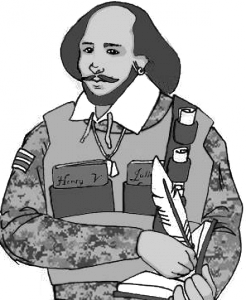Those of us lucky enough to stand on a stage and speak the beautiful poetry of William Shakespeare have a deeply rooted faith that it makes us better people. His words plunge us into our deepest emotional selves, make sense of pain, and float us on waves of ecstatic love. They enlighten us to the complexity of our human-ness and forge deep connection with, and compassion for, our human family.
So strong is our faith, that we are called to share this love (a word appearing 2,191 times in the canon) with others who might not yet have experienced it. In my case, along with my two partners, Bill Watson and Jim Tasse, I find myself in the company of combat veterans.
What has an English playwright from 1616 to offer the modern warrior of 2016? There are the words about PTSD, depression, the struggle with alcohol, the alienation of husband and wife, and the contemplation of suicide. His plays tell stories of families, battles, journeys and honor. The metaphors describe the experiences of love, of loss, of hurt and anger in terms that teach the body to feel again. And provide a mask:
“Shakespeare is an opportunity to be open without exposure, or the vulnerability that comes with sharing a deep and hidden part of my past. Being able to connect with a character psychologically and act it out physically[…] is amazing.”
(Omar Kebir, Army Veteran)
These are big stories that use big words that can carry big emotions. In everyday language, we minimize our experiences or run the risk of losing our human support network. Shakespeare’s rich, poetic language gives the veterans a safe place to tell the stories they carry with them. These are not their words or their stories but these are their emotions, too big to keep inside.
…O, I could weep my spirit from mine eyes.
Warriors go into places full of danger and terror to defend the freedom and safety of their country and it’s citizens. Shakespeare allows them, once again, to be warriors, going to the interior places of danger and terror to fight for the freedom and safety of their human spirit.
Then will he strip his sleeve and show his scars,
And say, these wounds I had on Crispin’s day.
400 years after the death of William Shakespeare, we still come to him to help us understand ourselves, to reconnect us with those we might lose and to find the words, words, words!
To me, fair friend, you never can be old,
For as you were when first your eye I eyed,
Such seems your beauty still!


